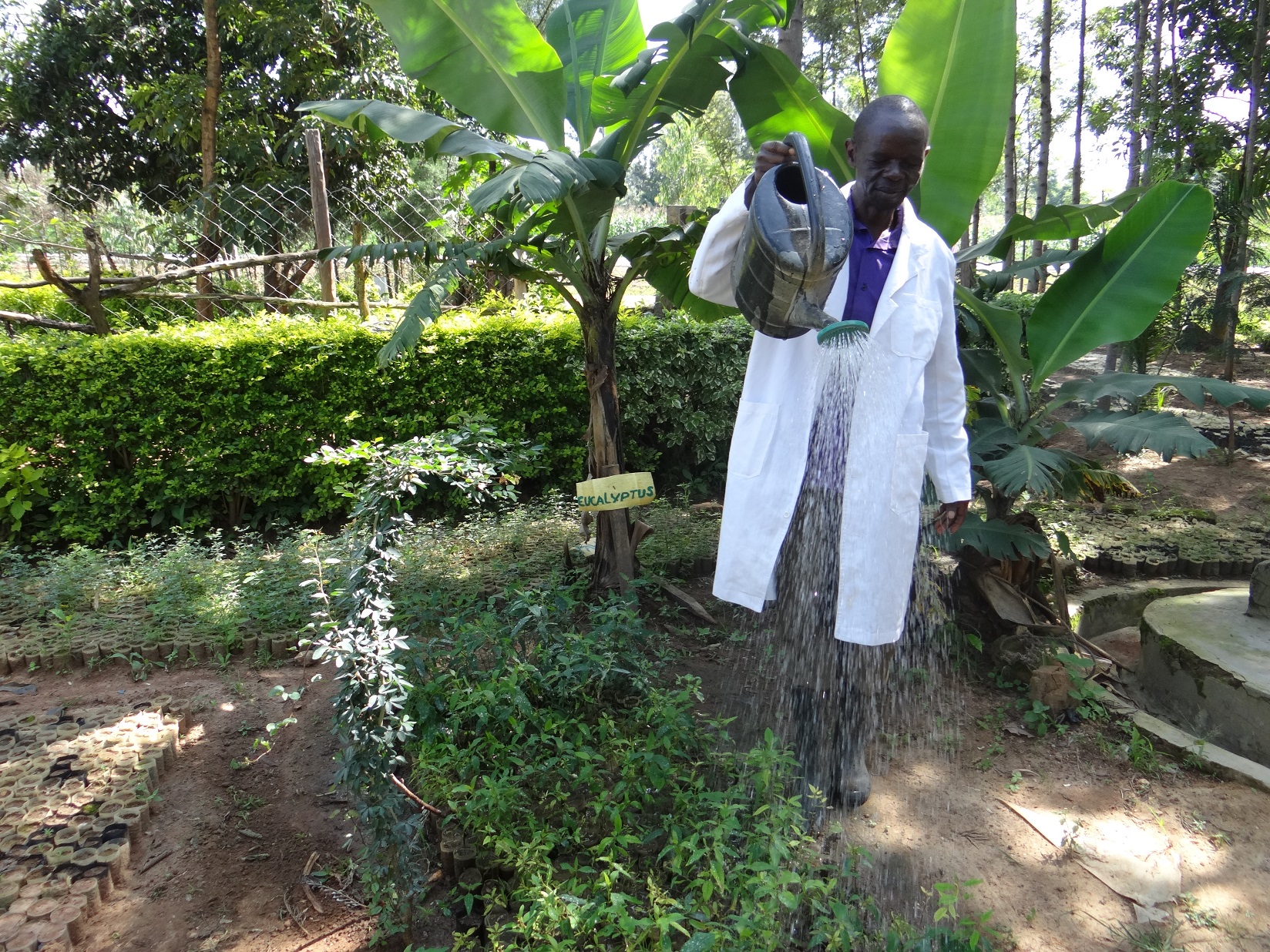His passion for environmental conservation led him to delve into a tree nursery project, which five years later has attracted several organizations.
This is to further sensitize other youths to engage in activities that safeguard the environment.
Peter Wafula Weboya from Sikata, Bungoma County narrates how he started engaging the youth at Mechimeru sub location on several ways on how they can make a living from farming and conserve the environment through tree planting. Using his basic knowledge of agriculture, the 51-year-old came up with measures that could save his community from persistent dry spells and drying of natural springs that provided water for thousands of Mechimeru residents.
He walked from home to home, door to door steering tree planting campaign at Mechimeru, urging people to embrace reforestation, with the hope that his community will be free from soil erosion and lack of water if they heed to his considered views.
“I used to visit homesteads urging people to plant more trees because some used to cut trees without replacing them,” Weboya recalls.
After about two weeks, the industrious farmer got a flock of 75 youth, who were willing to join the journey to see the people of Mechimeru live in an environment free from environmental degradation.
The youth were committed to the training that Weboya offered – business farming and tree nursery management and started a tree nursery project, comprising five species of indigenous and exotic tree seedlings. Weboya says the project has since matured and the youth are continuing to reap from their sweat and the environment too is well conserved.
“I am very happy that they worked hard on the tree nursery project. They have sold almost 2.5 million seedlings since they started the project back in the year 2010, and they are very grateful that I engaged them in environmental conservation projects” Weboya says, with a broad smile.
Initiated his own project
Having nurtured a group that would help him in his journey towards safeguarding the environment, he initiated a tree nursery project in his homestead at Sikata in the year 2010.
Weboya says he got his family involved in the project and highlighted to them the economic benefits that would come with dedication to the project. His wife and eldest son Andrew Wafula embraced his ideas and they started off with 50 tree seedlings – among them eucalyptus, grevillea, Cyprus and medicinal tree seedlings such as aloe vera and neem tree (Muarubaini).
![Some of the seedlings Weboya grows among them eucalyptus, grevillea, cypress and medicinal tree seedlings such as aloe vera and neem tree (Muarubaini). [Photo: Njenga Hakeenah]](https://www.monitor.co.ke/wp-content/uploads/2015/12/Seedlings_NHakeenah.jpg)
“After I convinced my family to engage in tree nursery project I continued to appeal to the community to embrace similar projects so that we can save ourselves from disasters related to deforestation,” recalls Weboya.
Five years later, he says he has sold over two million tree seedlings. This has enabled him to roof his house, have electricity in his homestead and educate his children. Wafula, his eldest son is now a graduate from Kisii University, with a degree in business administration. Wafula now helps his father to tend the tree nursery and is grateful to his father for having started the project.
“I feel very happy now because it is because of this project that I got my university education. Even as I am looking for a white collar job, I have to help my father to maintain this tree nursery to see it grow even bigger,” says Wafula.
Weboya reveals that he obtains a minimum of Sh150,000 annually from the sale of tree seedlings. He however admits that he faces the challenge of marketing his produce to potential customers.
Organizations’ Support
Weboya says he has received a lot of support from the government through the Ministry of Agriculture and Kenya Forest Service. The ministry has organized farmers’ training in Bungoma County which he says have benefited him and other farmers in the county to improve on their farming methods to come up with more, high quality yields.
“The Ministry of Agriculture has really supported us through trainings and seminars. I have learnt a lot more about environmental conservation from the trainings. I would like to urge the government to continue offering support to farmers in the country,” a delighted Weboya says.
He has also received financial support and training from International Centre of Insect Physiology and Ecology (ICIPE) on how to manage pests, pathogens in his farm to always produce high quality seedlings.
Food and Agricultural Organization (FAO) donated a car to Weboya, to help him ferry tree seedlings to the market and to individual buyers. In addition to that, ICIPE donated a laptop and a camera to him; to enable him research online on better farming methods and digitize his farm records. The organization also donates seedlings to him – both exotic and indigenous.
Western Kenya Community Driven Development & Flood Mitigation Project (WKCDD/FMP) – a Government of Kenya and World Bank initiative that empowers local communities to engage in sustainable income generating activities through training and funding in Western parts of Kenya – have also supported his project through funding and training.
Future plans
“I am optimistic that I will gather enough funds before the end of this year to expand my piece of land where I can even host 1 million seedlings. Currently, I have 50,000 seedlings but I believe I can do more if I get land,” says Weboya.
He also says that he must adopt modern farming techniques such as the use of sprinklers to water his seedlings.
Weboya urges the youth to change their mindset about farming and to avoid engaging in activities such as robbery because they only endanger their lives and do not better the society.
He also urges the government to invest more in the agriculture sector and to train more people on environmental conservation and business farming to grow the country’s economy.


